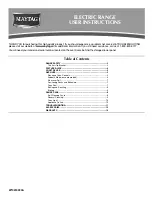
9
General Cleaning
IMPORTANT: Before cleaning, make sure all controls are off and
the oven and cooktop are cool. Always follow label instructions on
cleaning products. For additional information, you can visit the
Customer Care section of our website at www.maytag.ca.
Soap, water and a soft cloth or sponge are suggested first unless
otherwise noted.
EXTERIOR PORCELAIN ENAMEL SURFACES (on some
models)
Food spills containing acids, such as vinegar and tomato, should
be cleaned as soon as the entire range is cool. These spills may
affect the finish.
Cleaning Method:
■
Glass cleaner, mild liquid cleaner or nonabrasive scrubbing
pad:
Gently clean around the model and serial number plate
because scrubbing may remove numbers.
■
affresh™ Kitchen and Appliance Cleaner Part Number
W10355010 (not included):
See cover for contact information.
STAINLESS STEEL (on some models)
NOTE: To avoid damage to stainless steel surfaces, do not use
soap-filled scouring pads, abrasive cleaners, Cooktop Cleaner,
steel-wool pads, gritty washcloths or abrasive paper towels.
Damage may occur to stainless steel surfaces, even with one-time
or limited use.
Cleaning Method:
Rub in direction of grain to avoid damaging.
■
affresh™ Stainless Steel Cleaner Part Number W10355016 (not
included):
See cover for contact information.
Liquid detergent or all-purpose cleaner:
Rinse with clean water and dry with soft, lint-free cloth.
METALLIC PAINT (on some models)
Do not use abrasive cleaners, cleaners with bleach, rust removers,
ammonia or sodium hydroxide (lye) because paint surface may
stain.
CERAMIC GLASS (on some models)
Cleaning Method:
Use affresh™ Cooktop Cleaner Part Number W10355051 with
Cleaning Pad 31609 and Scraper Part Number WA906B to clean
and remove stains from the cooktop. Use Cooktop Protectant Part
Number 31463B and Protectant Applicator Part Number 31610
regularly to avoid stain buildup, pitting and scratching, while
conditioning the cooktop for easier future cleaning. These can be
ordered as accessories. See cover for contact information. The
Cooktop Scraper uses razor blades. Store razor blades out of the
reach of children.
Do not use steel wool, abrasive powder cleansers, chlorine bleach,
rust remover or ammonia because damage may occur.
Light to moderate soil
■
Can be cleaned with damp paper towels or sponge. Light
stains should be addressed with cleaner and cleaning pad.
Sugary spills (jellies, candy, syrup)
■
Clean with cooktop scraper and cooktop cleaner. Scrape off
sugary spills while the cooktop is still warm. You may want to
wear oven mitts while cleaning the cooktop.
Heavy soil, dark streaks, specks and discoloration
■
Clean with Cooktop Cleaner or nonabrasive cleaner and
cleaning pad:
Burned-on soil
■
Clean with Cooktop Cleaner, Cleaning Pad and Cooktop
Scraper.
Metal marks from aluminum and copper
■
Clean with Cooktop Cleaner and Cleaning Pad as soon as
cooktop has cooled down. The marks will not totally disappear,
but after many cleanings they will become less noticeable.
Tiny scratches and abrasions
■
Use Cooktop Cleaner and Cleaning Pad for scratches.
Scratches and abrasions do not affect cooking performance,
and after many cleanings they will become less noticeable.
COOKTOP CONTROLS
To avoid damage to the cooktop controls, do not use steel wool,
abrasive cleansers or oven cleaner.
Do not soak knobs. When replacing knobs, make sure knobs are in
the OFF position.
On some models, do not remove seals under knobs.
Cleaning Method:
■
Soap and water:
Pull knobs straight away from control panel to remove.
CONTROL PANEL AND OVEN DOOR EXTERIOR
To avoid damage to the control panel, do not use abrasive
cleaners, steel-wool pads, gritty washcloths or abrasive paper
towels.
Cleaning Method:
■
Glass cleaner and soft cloth or sponge:
Apply glass cleaner to soft cloth or sponge, not directly on
panel.
■
affresh™ Kitchen and Appliance Cleaner Part Number
W10355010 (not included):
See cover for contact information.
OVEN CAVITY
Do not use oven cleaners.
Food spills should be cleaned when oven cools. At high
temperatures, foods react with porcelain and staining, etching,
pitting or faint white spots can result.
Cleaning Method:
■
Self-Cleaning cycle: See “Self-Cleaning Cycle” first.
COIL ELEMENTS (on some models)
Cleaning Method:
■
Damp cloth: Make sure control knobs are off and elements are
cool.
Do not clean or immerse in water. Soil will burn off when hot.










































